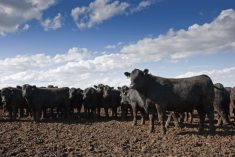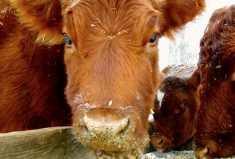The cost of compliance with a California animal welfare law, which takes full effect on New Year’s Day, will likely shrink the U.S. national hog herd and lead to further consolidation, a Washington State think tank says.
“No one will be spared the change in market pressures,” wrote Pam Lewison, director for the Washington Policy Center Initiative on Agriculture in a November policy brief.
“What those market pressures do to the overall higher cost of pork, however, won’t be known until the next marketing cycle after implementation,” she added.
Read Also

JBS profit falls amid still-challenging US market environment
JBS, the world’s largest meat company, reported a net profit fall in the third quarter in spite of a rise in global net sales amid a still-challenging beef market environment in the U.S., according to an earnings statement on Thursday.
Proposition 12, or “Prop 12,” was a California ballot initiative, passed in 2018. It said that meat and eggs could not be sold in California unless they came from animals raised in compliance with the state’s welfare regulations.
This includes foods imported into the state.
While egg and veal producers quickly fell in line, the policy brief said, pork producers—of which 99 per cent live outside California—challenged the law. This included taking the battle to the U.S. Supreme Court, which ultimately upheld Prop 12.
Pork distributors have until the New Year to submit third-party certification of compliance.
According to the brief, the hog industry estimates that the cost of retrofitting penning to comply with Prop 12 will be about USD $3,500 per sow. Proposition 12 specifies that each breeding sow much have at least 24 square feet of space, and have enough space to turn around, extend limbs, etc.
“For an average hog farm of 1,000 pigs, that represents a cost of $3.5 million,” Lewison wrote.
This with a projected average net cash hog farm income of $330,000 in 2023—down 28 per cent from 2022.
Pork producers have struggled this year with high costs in the midst of lowering demand and hog prices.
“Given the downturn in net income, the stark choice facing many small- to medium-sized farm owners may be to sell to larger farms,” Lewison said. “Consolidation in the meat production industry has long been a source of concern for producers, consumers, and even lawmakers.”
“Certainly, pork will become more expensive as both supply constricts and the actual cost of compliance is revealed,” she added.
Canadian concerns
The Canadian hog sector has been eyeing Prop 12 with concern. Canadian producers exported nearly 6.7 million hogs to the U.S. in 2022, including millions of weanlings.
The fear is that if Canada’s national swine housing standards don’t meet California’s regulations, American producers and processors may not want to purchase Canadian animals. However, there has been little clarity as to what the actual effects of Prop 12 will be for Canadians producers.
Also of concern is other states that have similar animal welfare laws in the works.
“We don’t negotiate separate trade agreements with 50 states. We need to be able to have a North American market that’s integrated, allows for the free flow of product and isn’t different in every different state,” said Manitoba Pork Council general manager Cam Dahl in a June interview with the Manitoba Co-operator.
The Canadian Pork Council has said its sees Prop 12 and similar laws as akin to non-tariff trade barriers and has pressed the Canadian government to take up the issue with the U.S.
In late September, the Canadian government told the Manitoba Co-operator it was analyzing the situation and, “considering the U.S.’ obligations under the World Trade Organization (WTO) and Canada-U.S.-Mexico Agreement (CUSMA).”
—Geralyn Wichers is associate digital editor of AGCanada.com. She writes from southeastern Manitoba.















